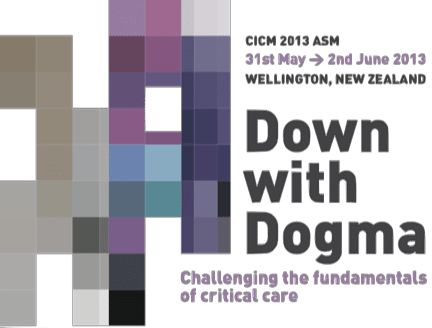CICM ASM 2013
This page coordinates the reference materials and resources for my talks at the 2013 Annual Scientific Meeting of the College of Intensive Care Medicine. The theme for the conference is ‘Down with Dogma — Challenging the Fundamentals of Critical Care’ and it is being held in Wellington, New Zealand, from May 31st to June 2nd 2013.
The greater the ignorance the greater the dogmatism.— Sir William Osler (1849 – 1919)

Toxicological myths and half-truths
What we think we know about the management of critically ill poisoned and envenomed patients is intertwined with dogma. Most of the things we do, we do because we think they might work, not because we know they will work. But why is this the case? What can be done about it? In this talk I will consider these questions as we delve into some of the myths and half-truths of critical care toxicology. Along the way we will find out whether glucagon antidotal therapy should be renamed ‘gluca-gone’, consider whether calcium in digoxin toxicity really ‘turns hearts to stone’, unravel the puzzle of liver transplantation for paracetamol toxicity and ride the rollercoaster of the role of antivenom in Australasian envenoming syndromes.
- Glucagon as an Antidote
- Calcium, Digoxin Toxicity and ‘Stone Heart’ Theory
- Liver Transplantation for Paracetamol Toxicity
- Gastric Lavage
- Medical Reversal
- Dogma and Pseudoaxioms
- Note that in the interests of time the section on Does Antivenom Work? was removed from the talk I gave at the CICM ASM 2013.
Social media and the internet: the future of medical education?
Niels Bohr once said that “prediction is difficult, especially about the future.” However, when it comes to medical education the future has already happened. Social media, together with what some of us call “FOAM” (Free Open-Access Meducation”), asynchronous learning and the concept of the ‘flipped classroom’ are becoming increasingly important in medical education. As adjuncts to face-to-face interaction and on-the-floor clinical mentoring these tools have the potential to level the playing field for everyone everywhere. They provide inspiration and interaction, facilitate knowledge dissemination and accelerate learning and innovation. This talk explores their potential using real world examples. But is this just another example of ‘gizmo idolatry’ run rampant? That’s for each of us to decide for ourselves; these tools are what we make of them.
An updated version of this talk is available online as ‘Why FOAM?… Facts, Fallacies and Foibles‘
- FOAM
- SMACC
- Information Overload
- The flipped classroom might just be the future of medicine (KevinMD)
- Gizmo idolatry
- Peter Safar’s Laws for the Navigation of Life
Suggested FOAM resources for Intensivists:
- Intensive Care Network
- PulmCCM.org
- EMCrit
- Resus.ME
- Critical Care Reviews
- Ultrasound Podcast
- DerangedPhysiology.com
- Kerry Brandis’ Acid-Base Physiology
- Maryland CC Project
- Trauma Professional’s Blog

Critical Care
Compendium
Chris is an Intensivist and ECMO specialist at the Alfred ICU in Melbourne. He is also a Clinical Adjunct Associate Professor at Monash University. He is a co-founder of the Australia and New Zealand Clinician Educator Network (ANZCEN) and is the Lead for the ANZCEN Clinician Educator Incubator programme. He is on the Board of Directors for the Intensive Care Foundation and is a First Part Examiner for the College of Intensive Care Medicine. He is an internationally recognised Clinician Educator with a passion for helping clinicians learn and for improving the clinical performance of individuals and collectives.
After finishing his medical degree at the University of Auckland, he continued post-graduate training in New Zealand as well as Australia’s Northern Territory, Perth and Melbourne. He has completed fellowship training in both intensive care medicine and emergency medicine, as well as post-graduate training in biochemistry, clinical toxicology, clinical epidemiology, and health professional education.
He is actively involved in in using translational simulation to improve patient care and the design of processes and systems at Alfred Health. He coordinates the Alfred ICU’s education and simulation programmes and runs the unit’s education website, INTENSIVE. He created the ‘Critically Ill Airway’ course and teaches on numerous courses around the world. He is one of the founders of the FOAM movement (Free Open-Access Medical education) and is co-creator of litfl.com, the RAGE podcast, the Resuscitology course, and the SMACC conference.
His one great achievement is being the father of three amazing children.
On Twitter, he is @precordialthump.
| INTENSIVE | RAGE | Resuscitology | SMACC
